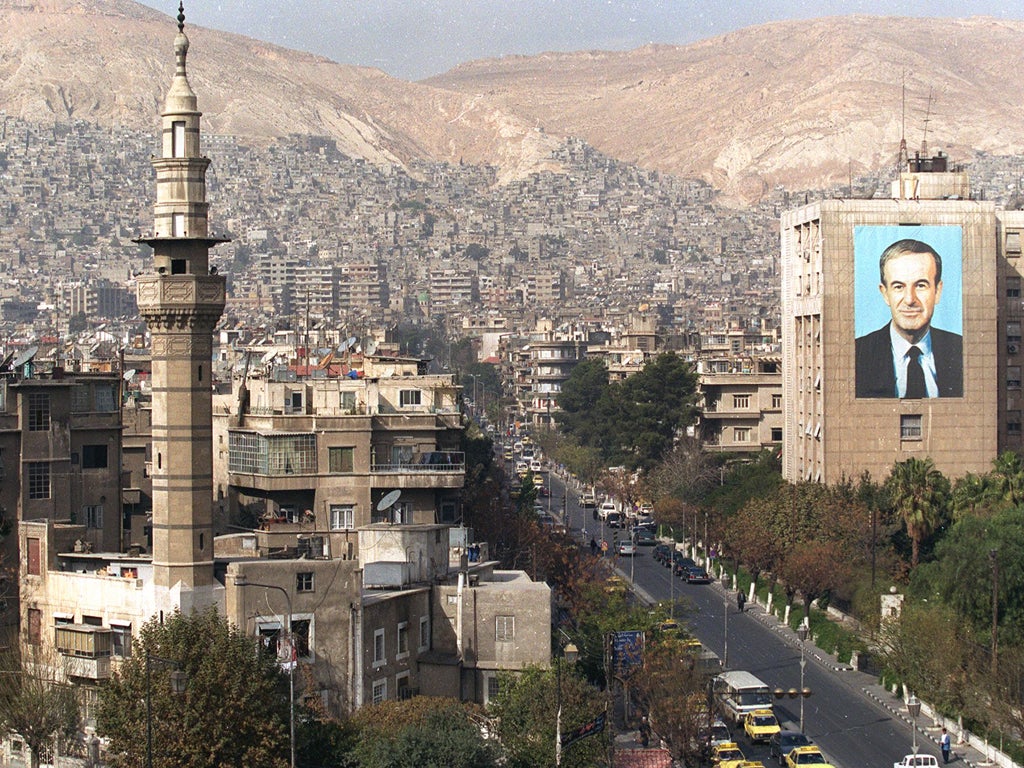Robert Fisk: Inside Damascus - memoirs reveal the Hafez approach
Hitherto unknown information has emerged from the confidential archives of the Syrian presidency and foreign ministry


Your support helps us to tell the story
From reproductive rights to climate change to Big Tech, The Independent is on the ground when the story is developing. Whether it's investigating the financials of Elon Musk's pro-Trump PAC or producing our latest documentary, 'The A Word', which shines a light on the American women fighting for reproductive rights, we know how important it is to parse out the facts from the messaging.
At such a critical moment in US history, we need reporters on the ground. Your donation allows us to keep sending journalists to speak to both sides of the story.
The Independent is trusted by Americans across the entire political spectrum. And unlike many other quality news outlets, we choose not to lock Americans out of our reporting and analysis with paywalls. We believe quality journalism should be available to everyone, paid for by those who can afford it.
Your support makes all the difference.“Clinton impressed Assad: a young man who appeared to want to be neutral”
What would Hafez have done? Every Syrian asks this question. Would the old lion of Damascus, whose son Bashar al-Assad became president when he died in 2000, have handled the present Syrian tragedy more harshly or more leniently? Would Hafez have allowed Syria to collapse into civil conflict so quickly? Would he have used the same ruthlessness as he did when he destroyed the Muslim Brotherhood at Hama in 1982 at a cost of up to 20,000 lives? Or would Hafez have reined in the secret police and acknowledged the original street demonstrations as an opportunity to turn away from dictatorship?
The dead cannot speak. But hitherto unknown information has emerged from the confidential archives of the Syrian presidency and foreign ministry, published in a new book by Bouthaina Shaaban, who spent ten years as Hafez’s interpreter and is still an adviser to his son Bashar.
Shaaban was in on many of the 1990s “peace process” talks between Hafez and George Bush and Bill Clinton, and between secretaries of state Warren Christopher and Madeleine Albright and the then Syrian foreign minister (now vice-president) Farouk al-Sharaa – not to mention Israeli leaders. Her book, Damascus Diary, provides new insight into that most powerful and intriguing of Arab leaders, written as her country has fallen apart over the past two years.
Shaaban’s tale begins in the immediate aftermath of the liberation of Kuwait from Saddam Hussein in 1991, when Bush Sr’s secretary of state, James Baker, arrives in Damascus to persuade Hafez al-Assad to send a delegation to “peace” talks with the Israelis and other Arab nations in Madrid. Baker tells Hafez that the oil fires lit by Saddam “can reach as far as Iran and Turkey”. Assad smiles, replying: “There are fires that we see and others that we don’t. The invisible fires can sometimes be more dangerous than the actual ones.” It’s a response that he might have uttered – in a different context – had he been alive two years ago.
Assad demanded the return of all the Golan Heights – occupied by Israel since 1967 – based on the pre-war borders, every square foot of Syrian land in return for complete peace, an Israeli retreat before even an exchange of ambassadors. Assad demanded that the Russians and the United Nations co-sponsor Madrid. And he got his way. Baker said he agreed to UN participation, angrily claiming that he always said “yes” to Assad. His reply? “But in fact, you are not saying yes, Mr Baker ... you are saying no! I asked you to say yes to UN sponsorship ... but you said no.”
Baker said he could provide 50 per cent of what Syria wanted for the conference. “In order to reach 100 per cent, we have to take our clothes off,” Assad responded. “We have a decision in Syria never to take our clothes off!” The Syrians attended Madrid, but it was a flop. Yitzhak Shamir walked out of the talks and Syrian foreign minister Sharaa famously held up a British Mandate “wanted” poster for the “terrorist” Shamir.
Clinton impressed Assad: a young man who appeared to want to be neutral in the Arab-Israeli dispute – an illusion of course, but that’s what Assad thought. Warren Christopher told Assad that Middle East peace would be Clinton’s first priority. But Assad had personally heard the same from Nixon, Carter and Bush. “The previous administration was also serious,” he said. “But when elections started, everything related to peace came to a grinding standstill.”
Clinton and Assad negotiated what was called the Rabin Deposit, the idea of going back to the stage of negotiations reached with Yitzhak Rabin. This included the dismantling of Jewish colonies on Golan and a staged Israeli military withdrawal.
There is much more – including a fascinating phone conversation in which Clinton blamed Israel for the Shepherdstown failure – but of course, a healthy dose of salt must be added to this account. It doesn’t tally with others who were present at the talks, as Shaaban admits, but the voice of Hafez al-Assad is genuine enough. Here was one tough man who wouldn’t give an inch on sovereignty but liked Clinton and even understood Israel’s need for security.
So what would Hafez do today? Endure the Obama condemnation as Bashar has done? Fight back? Or give way to history and retire? His son has not vouchsafed his views on this. It’s the question I would like to ask him.
Join our commenting forum
Join thought-provoking conversations, follow other Independent readers and see their replies
Comments